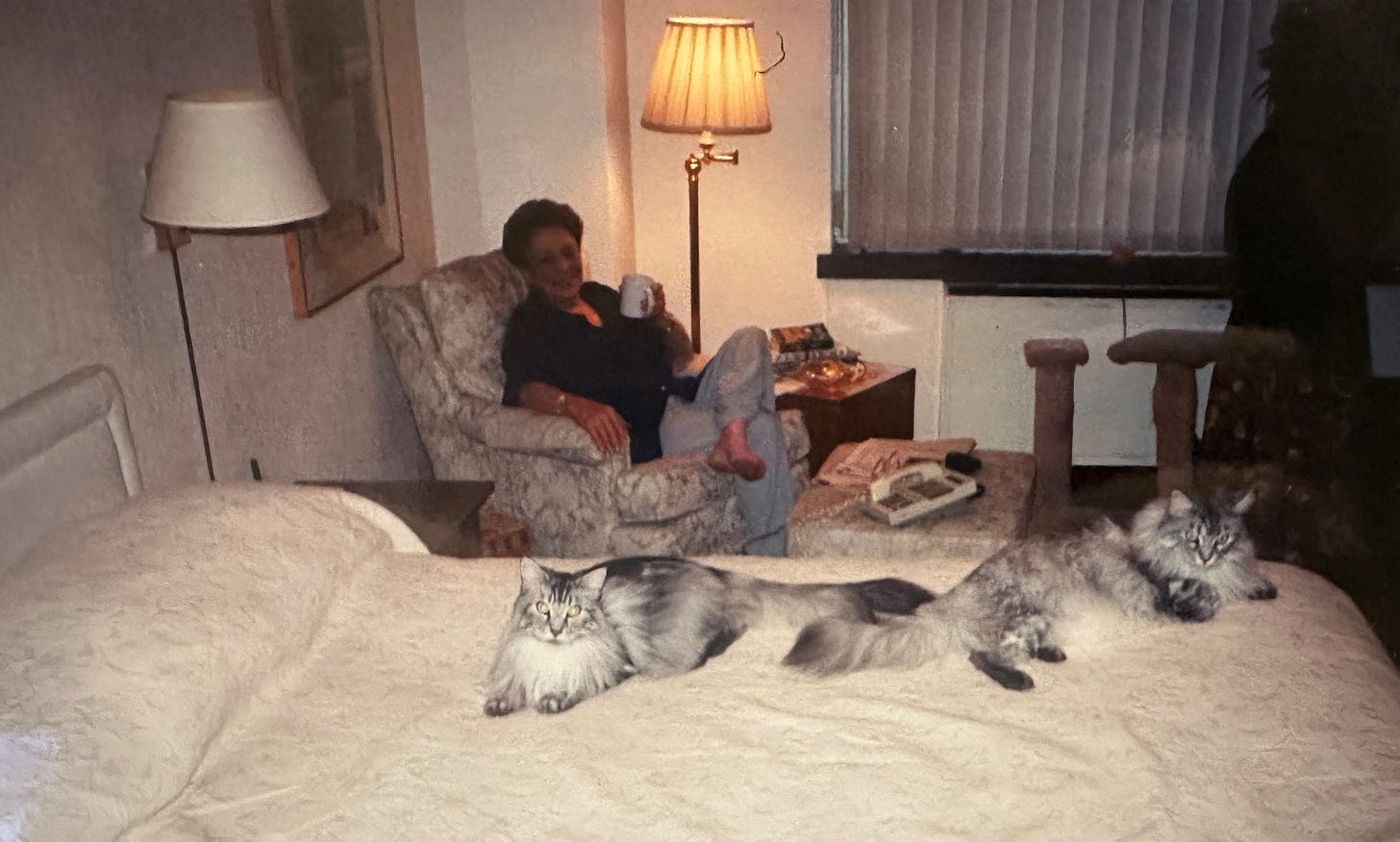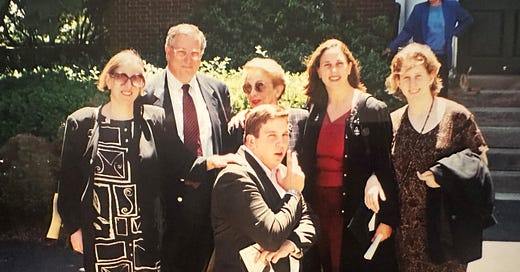
Bonus 2: "I Finally Get Thanksgiving!"
How Thanksgiving figured prominently in a family of (over-achieving) lawyers...
In addition to the regular (free) Monday newsletter, every Thursday, paid subscribers to “One First” will receive access to fun (I hope) bonus content—featuring more of a personal spin on me and my Supreme Court-related work, along with more opportunities for us to interact and for me to answer your questions. (Okay, and maybe share the occasional pictures of Roxy.)
If you’re not a paid subscriber, fear not; you didn’t receive this in error. To help give everyone a sense of what to expect from the bonus content, the first two bonus posts (last week’s and today’s) will be free and available to all. Starting next week, the main weekly Monday post will remain free to all, but the bonus content will be available to paid subscribers only. (And if you’re not already a free or paid subscriber, now’s a good time to start!)
In April 2004, when I was a second-semester 3L, I argued in the moot court finals at Yale. My younger sister, Abi, then a Yale College senior, came to watch (still one of her more remarkable recognitions of my existence to date). When the pain fun was over, she came up to me and said “I get it—I finally get Thanksgiving!” To her, it seemed, the closest thing to Thanksgiving dinner in the Vladeck family was a mock appellate argument.
Neither of my parents are lawyers, but I grew up in a family full of them. My grandmother, Judith, graduated from Columbia Law School in 1947 (as she was fond of pointing out, nine years before Ruth Bader Ginsburg). In the 1950s, she joined a law firm that my grandfather (after whom I’m named) had helped to form, one of the first union-side labor firms in New York. (And two of their three kids went on to stellar legal careers of their own—my Aunt Anne, who succeeded Judy as managing partner of the firm that came to be known as “Vladeck, Waldman, Elias and Engelhard”; and my Uncle David, who’s on the faculty at Georgetown University Law Center after prior stints as the Director of the Public Citizen Litigation Group and Director of the FTC’s Bureau of Consumer Protection.)
Grandma Judy had quite a career. Into the 1970s, her focus shifted from labor law to employment discrimination, where she brought some of the big early sex discrimination cases under Title VII of the Civil Rights Act of 1964. In 1973, in a suit against the City University of New York, she compiled historical salary data for over 5,000 women faculty members—leading a judge to conclude that CUNY had engaged in a 15-year-long pattern of discrimination. In 1975, she sued Pace University after it denied tenure to Professor Val Winsey. When the university argued that Winsey was a troublemaker who spent too much of her time protesting university (and outside) policies, Grandma’s response was that “The only way women are tolerated is if they are supine, silent and submissive.” (She won that case, too.)
The list of her landmark victories goes on (including one of the first cases to endorse the now-prevalent theory of “front pay”), but suffice it to say, as her New York Times obituary put it, “Proud of her courtroom contentiousness, Ms. Vladeck brought a combination of showmanship and detailed analysis of salary histories and job performance to her cases.” She even argued a case in the Supreme Court in 1980 (alas, she lost, 6-3).
Grandma didn’t leave the showmanship and detailed analysis for the courtroom, hence the Thanksgiving connection. Every year on Thanksgiving, we’d make two different trips uptown to Grandma’s apartment, which overlooked Central Park West at 72nd Street: The first was for the Macy’s Thanksgiving Day Parade, for which Grandma always put out the New York brunch spread to end all New York brunch spreads. Her fourth-floor windows provided a perfect vantage point from which to be spectators as the floats marched from the Museum of Natural History to Herald Square. Later came dinner, which regularly devolved into a series of interlocking (and increasingly loud) debates about whatever the topics of the day happened to be. I don’t remember any of the specifics, other than that (1) I was never hungry for dinner given the brunch; and (2) Grandma always won.

Grandma died in 2007 from complications of emphysema (which might have had something to do with her 60-year cigarette habit). But there are two memories I have of her that particularly stand out, and that I’ve tried to pass along to my students at (different) moments: The first was in November 2005, when I found out I had passed the bar. Grandma was my very first phone call. And I remember her reaction, in her cigarette-scarred, New Yorker voice: “Oh thank God!” It was vintage Grandma: Not celebratory or congratulatory; just relief.
The second was just over two years earlier, when Grandma was one of the recipients of the ABA’s Margaret Brent Award for Women Lawyers at its 2003 National Convention. In her speech, she recounted the history of the English common law offense of being a “common scold,” which was usually defined as a troublesome and angry woman who disturbed the peace by habitually arguing with her neighbors. After noting that New Jersey didn’t abolish the offense until 1972 (“Everything’s legal in New Jersey”), she went on to exemplify the definition by criticizing the ABA for even having an award for “women lawyers” in the first place. At the end of the speech, she had her children and grandchildren stand up. While people were clapping for us, she scooted off the stage. That was her style.

Thanks for checking out this week’s “One First” bonus content. If you’ve enjoyed it, I hope you’ll considering sharing it:
The next regular issue will drop Monday at 8 a.m. ET; and next week’s bonus content, which will be available only to paid subscribers, will hit inboxes at 8 a.m. ET next Thursday.
If you’re already a subscriber, thank you!! And if you’re not yet but you made it this far, what’s one more click?:
Happy Thanksgiving, all!










